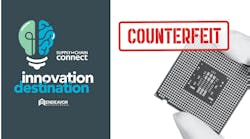What is digital transformation? What are the challenges—and successes—your business can expect from going through such a process? In this Innovation Destination – Executive Perspectives episode, Tony Powell, the co-founder and Chief Technology Officer of Orbweaver, explains why NOW is the time for those in the electronic components industry to undertake the digital transformation journey—and how to do so successfully.
This interview was edited and formatted for clarity.
Tyler Fussner, Managing Editor, Supply Chain Connect
Hi Tony, thank you for joining us today.
Tony Powell, Co-Founder & CTO, Orbweaver
Yes, thanks, Tyler. Thanks for having me.
Fussner
If you could please introduce yourself to our audience.
Powell 0:27
Sure, I’d be happy to. My name is Tony Powell. I’m the CTO and Co-Founder of Orbweaver. Orbweaver was founded in 2012. We are specific to the electronics manufacturing industry. Our job is to help solve some of the digital transformation challenges that companies are facing today in the space.
Fussner
I wanted to talk to you today about digital transformation. As one of the authors of the book “Digital Transformation in the Electronics Industry” I have a question for you. Maybe it’s a simple one; maybe a pretty deep question. What is digital transformation?
Powell 1:04
It is surprisingly simple. You’ll hear me say this over and over, but the concept of digital transformation is fairly straightforward, and it winds up getting a little bit of reputation for being something more complicated than it needs to be. The right way to think about it is in business today, there are processes that are done very manually. A really good example is let’s say a component manufacturer is assembling a list of parts to be distributed, or sent, transmitted to their distribution network. In many cases, right now, that’s done manually. A person at that company might swivel chair to their manufacturing systems and see what a lead time looks like. And then they might swivel chair over to marketing, let’s say, and they might pick up new data sheets and new spec sheets. And then they might swivel chair over to product management and pick up pricing and assemble it all together in a spreadsheet, and then literally email that around. That is a really, really good example of something that can be digitized very, very simply and very easily, and will save a lot of time.
Anybody can take that data from those three systems that I just mentioned in that example, automatically assemble it in a way that is unified and then transmit it to those trading partners or to those distribution partners in a way that they even prefer—maybe they don’t all like to get it in a spreadsheet, maybe one of them wants to receive it via EDI, maybe one of them wants to receive it, via CXML or via an API, and maybe somebody does like the spreadsheet.
That’s really what digital transformation means. It means taking a business process that’s really cumbersome, and usually quite expensive—if you think about the way that that process would go the way I described it, the price of that process is very high, because you’re paying a person to do that. Usually, these are very high-value employees; they should be doing something else like working on customer relationships or working on sales or working in IT as opposed to doing something simple like hand-assembling a spreadsheet. Again, coming back to where I started, it really is quite simple. The right way to think about it is those complex processes that are right now being hand-done, taking those and making those happen in an automated and digital fashion.
Listen to the rest of the episode on the podcast player above or below, or wherever you listen to podcasts, picking up at the 3:21 mark!









